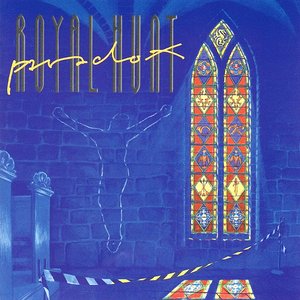Published on Feb 24, 1998
So who says progressive metal is dead?
Rush might be at a temporary standstill due to events out of the
band’s hands. Queensryche is in a period of regrouping after the
departure of Chris DeGarmo. The door is pretty wide open for
someone else to step forward and move the genre ahead – and that
band is Royal Hunt. Their latest effort
Paradox is an album that is sure to challenge your ear, as
well as your views on religion, and is an album that, for the most
part, is a success.
Led by American vocalist D.C. Cooper (who was once considered as
a finalist to be Judas Priest’s next singer), this Danish
four-piece knows how to work harmony and hook together to create
well-done songs that seem to fly by. However, I often wished I
would have heard Jacob Kjaer’s guitar work take the forefront, not
just Andre Andersen’s keyboard work (good as it is, though).
The bulk of
Paradox is a set of interconnected songs which challenges
the world of religion and beliefs in God – often in stronger terms
than I’ve heard in a long time. The strongest condemnation comes on
“Message To God,” where Andersen’s song dares to reject the notion
of a “supreme Being”. Using Andersen’s words, Cooper wonders in
song how an all-caring God could allow us to kill each other in His
name: “We’re busy burning witches the way we’ve learned from you /
We’re good at killing creatures, so teach us something new.” Even
stronger: “Forget me, you’ve left me.” Whether you agree with the
opinions expressed, you can’t help be affected by the emotion in
the words.
But the pain in feeling deserted by God is nothing compared to
the feeling that the protagonist is being tortured by God, as heard
in “Silent Scream” – no, not a song about abortion: “Dear God gave
me such a life full of pain, / It’s sharp just like a knife / I can
think, but I can not tell, / What’s life to you to me is hell.”
Likewise, our tragic hero awaits his judgment on “It’s Over,”
comparing himself to Jesus: “I’m on the same path to the cross as
last time / They’ll crucify me once again – you’ve broken my heart
/ As you did it before / Judas I’ll wait, come and knock on my
door.”
The disturbing thing about
Paradox is not the rejection of God – or, perhaps more
correctly, the image we have built of God, it is the fact that
someone who turns away from the album due to its lyrical content
will miss out on some solid musical performances. Often the songs
remind me of artists like Yngwie Malmsteen without the shredding
guitar riffs. Allan Sørensen’s drum work is exceptional,
while bassist Steen Mogensen doesn’t express himself as much as he
probably should have. Andersen wanted to create his masterpiece
with
Paradox, from the songwriting (only one cut, “The Final
Lullaby,” wasn’t written by Andersen) to the keyboard work to the
production – and he succeeds… almost.
The only real down side to this album is that most of the songs
are interwoven, provising little if any break from such a deep
message. And while the music and songwriting is strong enough to
partially overcome this, it would have been nice to get even a few
seconds in between tracks to let up from such thought-provoking and
thought-challenging words. Still, this is a minor complaint.
Will
Paradox be the breakthrough for Royal Hunt in America?
Probably not – but that’s due to the strong opinions on religion
expressed in 55 minutes. Others who might show some interest in the
band may be turned off by the idea that Royal Hunt has written
theme music for wrestlers in Japan. (My thoughts – keep an open
mind – it’s not that bad.) Fact is, Royal Hunt has everything going
for them at this point – strong songs and performances. All they
need now is a break. Here’s hoping that enough people give
Paradox that opportunity – it’s not puzzling to understand
why this band is as good as it is.
